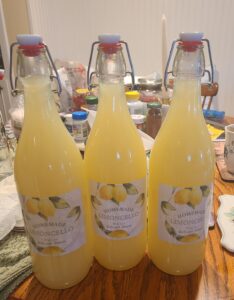Reasons to Buy Organic Lemons:

Many people are looking for clarification on why buy organic lemons and when should they buy organic lemons.
The reason for this confusion is that there is a lot of misinformation out there and the answer on when to buy organic lemons is not straightforward. The choice to buy organic lemons, chemical-free lemons, or “conventionally-grown” lemons depends on your individual health needs and preferences and your budget.
Contrary to the common misconception, organic fruit is not free of pesticides, fungicides, and other chemicals. Organic farming uses specific types of chemicals that are more regulated.
The only way to ensure that you don’t consume chemicals is to buy chemical-free fruit, which is very rare and difficult to find. This is what we offer here at Zava Ranch.
Of course, here at Zava Ranch we strongly believe that buying organic fruit is better than conventional fruit grown with unregulated chemicals, and domestic naturally-grown chemical-free fruit is better than organic fruit.
The only reason not to buy organic fruit (or ideally chemical-free fruit) is cost. It is a fact that organic fruit is harder to grow and it costs more. Your choice depends on your budget, and whether you can afford to prioritize your health (or if you can afford not to).
It is better to eat any fruit than no fruit and it is better to buy organic fruit if you can afford it.
If you can buy beyond-organic chemical-free fruit that is even better for your health and the planet.
To better understand all this terminology, pleas review:
- What is organic fruit?
- What is organic farming?
- Beyond-organic farming in California
- Is organic good or bad?
- What is the difference between organic and veganic?
Q: So… Why Buy Organic Lemons?
A: Because Conventional Citrus Fruit Production Relies Heavily on Pesticides, Poisoning Humans and the Environment
 The use of pesticides is widespread in citrus fruits production for pre- and post-harvest protection and many chemical substances are applied in order to control undesirable molds and insects.1
The use of pesticides is widespread in citrus fruits production for pre- and post-harvest protection and many chemical substances are applied in order to control undesirable molds and insects.1Citrus farmers around the world treat lemons and other citrus crops with pesticides for understandable reasons — armies of pests plague citrus, threatening to decimate entire crops.
The Environmental Working Group (otherwise known as the EWG), has released its updated list of the 12 “dirtiest” and the 15 cleanest fruits and vegetables.
While not in the Dirty Dozen, citrus fruits were also spotlighted in a special report by the EWG.
In January and July 2020, EWG scientists purchased and peeled 25 samples of conventionally grown (non-organic) grapefruit, lemons, mandarins and oranges.
The edible portion of the fruit was tested for pesticide residues by an independent laboratory accredited by California.
As a result of the study Environmental Working Group recommends buying organic lemons grown locally or at least domestically in order to minimize your pesticide exposure.
The two hormone-disrupting fungicides imazalil and thiabendazole, one of which is also a likely carcinogen, were detected on nearly 90 percent of non-organic citrus fruit samples in tests commissioned by EWG. More than half the samples contained both fungicides.
Both chemicals disrupt the body’s hormones, or endocrine system, which regulates metabolism, growth and development, and other important functions. They can also harm the reproductive system, and California classifies imazalil as a chemical known to cause cancer.
Doesn’t Organic Produce Also Have Pesticides?
Yes, it does.
Some people have critiqued EWG report and findings because organically grown produce also has pesticides. EWG report is misleading because it is not showing us a comparison of what pesticides exposure we would get from eating organic produce in comparison to eating conventional produce.
Organic designation is not equal to no pesticides, it just means that there is more oversight and some regulations on what pesticides are allowed. This is a common misconception.
Here at Zava Ranch, we are aware of influence of chemicals (and specifically pesticides) on human body.
We also live on the farm and eat fruit of our trees. Our farm is our home. It is not a stand-alone commercial operation.
For this reason we practice natural farming, also called Beyond Organic farming, or Chemical-Free agriculture. We don’t use any chemicals, regardless of whether they are considered synthetic or organic.
Zava Ranch fruit is grown with no pesticides, insecticides, fungicides, or any chemicals of any kind.
Why Are Lemons not on Dirty Dozen List? (but they should be)

Dirty dozen are not the only produce that we should buy organic, it is just a list of the worst offenders to prioritize if you have to choose.
Dirty dozen list also assumes that we are not eating the peel. For example, growing strawberries, blueberries, and greens relies heavily on pesticides and because they are consumed whole (having no rind or peel to remove) they are very high on the dirty dozen list.
Most people who eat citrus do not eat the skin, so the assumption is that pesticide exposure will theoretically be lower.
So, if you choose not to buy organic fruit, at least don’t eat the peel.
Except, the peel of citrus fruit has so many health benefits.
How does it make sense to “save” money on buying pesticide-loaded fruit and then throw away a very flavorful, beneficial and most nutritional part of it?
Organic Lemon Peel as Medicine – Health-Related Clean Diet:

They are using organic lemons as medicine.
In this situation people use the whole lemon, including the skin.
When eating organic lemons on a daily basis to manage a chronic condition such as cancer or heart disease, people definitely do not want to ingest a large number of pesticides, fungicides, insecticides, waxes, coatings, etc.
People who choose to eat a very clean diet and not ingest any unnecessary chemicals for health-related reasons order unwaxed unsprayed organic lemons from Zava Ranch regularly.
To serve these customers, we are offering a variety of options for subscriptions of organic lemons, which can be ordered on weekly, biweekly, or monthly basis.
Whole lemons, including pulp and peel, are often consumed for weight loss, heart health, and anti-cancer properties among others.
According to MedicineNet.com, anecdotal research suggests that consuming lemon peel tea can prevent the common cold, flu, ear infection, and urinary tract infections because lemon peel has antimicrobial qualities. Lemon peel slows the growth of fungi and bacteria that are resistant to antibiotics.
In Traditional Chinese Medicine (TCM):
Citrus peel is used to stimulate “Spleen Chi,” which is a metabolic element of digestion. Herbs for Spleen Chi aid the absorption and assimilation of nutrients from food by improving circulation and digestive fluids within the GI tract.
Lemon Peel is known for its ability to promote qi circulation, resolve dampness and phlegm, clear heat and toxicity, and cool the liver.
Organic Lemon Peel for Culinary Creations:

Many of our customers buy organic lemons to make Limoncello, lemon desserts, marmalade or preserved lemons, where once again they are using either the whole lemon or just lemon peel or zest.
And people don’t want their creations to be highly loaded with unregulated chemicals, coatings, and waxes dramatically increasing their consumption of disruptive compounds.
What are your reasons for buying organic lemons (or not)?
Of course, everything that was said above answers the question of not just why buy organic lemons but also why buy organic citrus in general.
We made a choice to grow chemical-free food (even though it is a lot harder) and to buy organic as much as possible (even though it is more expensive and harder to find). We believe that is a better choice for our health and for the planet.
What are your thoughts on this topic? We would love to hear from you. Email us and let us know!
- Ortelli, Didier & Patrick, Edder & Corvi, Claude. (2005). Pesticide residues survey in citrus fruits. Food additives and contaminants. 22. 423-8. 10.1080/02652030500089903. [↩]

